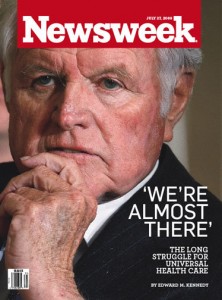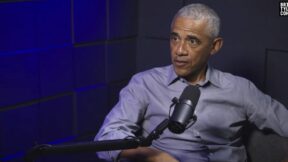Newsweek Beats Pack with Kennedy Eulogy
 With the passing of Senator Ted Kennedy this morning, a long procession of prepared obituaries in print and online. Given that Kennedy’s days have been numbered for over a year, any news outlet worth its salt had something in the drawer for when he passed.
With the passing of Senator Ted Kennedy this morning, a long procession of prepared obituaries in print and online. Given that Kennedy’s days have been numbered for over a year, any news outlet worth its salt had something in the drawer for when he passed.
But Newsweek beat them all to the punch. Kennedy appeared on the cover in July, and inside he had a feature’s worth of space to plead his case for health care and explain why the issue was so important to him. Newsweek effectively let Kennedy eulogize himself in an issue-oriented, classy and pragmatic way: The piece was called “The Cause of My Life.”
This is the cause of my life. It is a key reason that I defied my illness last summer to speak at the Democratic convention in Denver—to support Barack Obama, but also to make sure, as I said, “that we will break the old gridlock and guarantee that every American…will have decent, quality health care as a fundamental right and not just a privilege.”
…
Nothing I’m enduring now can compare to hearing that my children were seriously ill. In 1973, when I was first fighting in the Senate for universal coverage, we learned that my 12-year-old son Teddy had bone cancer. He had to have his right leg amputated above the knee. Even then, the pathology report showed that some of the cancer cells were very aggressive. There were only a few long-shot options to stop it from spreading further. I decided his best chance for survival was a clinical trial involving massive doses of chemotherapy. Every three weeks, at Children’s Hospital Boston, he had to lie still for six hours while the fluid dripped into his arm. I remember watching and praying for him, all the while knowing how sick he would be for days afterward.
During those many hours at the hospital, I came to know other parents whose children had been stricken with the same deadly disease. We all hoped that our child’s life would be saved by this experimental treatment. Because we were part of a clinical trial, none of us paid for it. Then the trial was declared a success and terminated before some patients had completed their treatments. That meant families had to have insurance to cover the rest or pay for them out of pocket. Our family had the necessary resources as well as excellent insurance coverage. But other heartbroken parents pleaded with the doctors: What chance does my child have if I can only afford half of the prescribed treatments? Or two thirds? I’ve sold everything. I’ve mortgaged as much as possible. No parent should suffer that torment. Not in this country. Not in the richest country in the world.
Some of our favorite clips from Kennedy eulogies in this mornings press:
He was a Rabelaisian figure in the Senate and in life, instantly recognizable by his shock of white hair, his florid, oversize face, his booming Boston brogue, his powerful but pained stride. He was a celebrity, sometimes a self-parody, a hearty friend, an implacable foe, a man of large faith and large flaws, a melancholy character who persevered, drank deeply and sang loudly. He was a Kennedy.
Kennedy served in the Senate through five of the most dramatic decades of the nation’s history. He became a lawmaker whose legislative accomplishments, political authority and gift for friendship across the political spectrum invited favorable comparisons to Daniel Webster, Henry Clay and a handful of other leviathans of the country’s most elite political body. But he was also beset by personal frailties and family misfortunes that were the stuff of tabloid headlines.
He was hardly the first rich person to care. Oblige has gone with noblesse for ages; Franklin Roosevelt, creator of the New Deal, was a rich aristocrat. But there was a seriousness, a doggedness to Kennedy. He was no dilettante, no limousine liberal. He was a prodigious worker, the strongest force in the government for women’s rights and health care, civil rights and immigration, the rights of the disabled and education. He was effective: in the Senate, to get something done, you went to Ted Kennedy.
New: The Mediaite One-Sheet "Newsletter of Newsletters"
Your daily summary and analysis of what the many, many media newsletters are saying and reporting. Subscribe now!






Comments
↓ Scroll down for comments ↓